Chelsea Wolfe “Night of the Vampire” Tribute to Roky Erickson
Watch this beautiful tribute to Roky Erickson from Chelsea Wolfe.
The Official Site
Watch this beautiful tribute to Roky Erickson from Chelsea Wolfe.
Chelsea Wolfe will be playing Pasadena Daydream Festival, curated by Robert Smith of The Cure, on August 31st.
Tickets on sale Friday, May 17 here: pasadenadaydream.com
 Chelsea Wolfe will be performing Levitation 2019 on Nov 9 at Central Presbyterian Church with support from Ioanna Gika. Tickets HERE
Chelsea Wolfe will be performing Levitation 2019 on Nov 9 at Central Presbyterian Church with support from Ioanna Gika. Tickets HERE
Saudade is a diverse supergroup featuring Deftones singer Chino Moreno, his bandmate in side project Crosses Chuck Doom, famed keyboardist John Medeski, and Bad Brains guitarist Dr. Know. Adding more creative juice to their already-stacked lineup, the collective has now collaborated on a track with goth siren and current Revolver cover star Chelsea Wolfe titled “Shadows & Light,” and the outcome is an opulent, melancholic slow burner that flexes the softer side of Wolfe and Moreno’s expansive ranges.
With the singers’ gossamer musings woven under and through the beat, the rest of the group’s talents are free to explore sides of music outside of their respective main groups. There’s still the occasional droning riff to chime in and add heft to the track, but a sparse soundscape magnifies the expert placement of keyboard plinks and fantastically intricate drumming that becomes more apparent with repeat listens.
“The song that we did was me, Chino and Chuck Doom, and it turned out really cool,” Wolfe recently told us of her collaboration with fellow Sacramento-bred artist Moreno. “It’s really different from Deftones and really different than my music. It’s something special and unique.” Stream the tune in full above — you can purchase a digital copy on iTunes.


Chelsea Wolfe has escaped into the woods and she’s not about to come back. You’ll find the singer-guitarist in the mountains of Northern California, hours from her Sacramento hometown, where the closest she gets to city life is in some tiny, ancient hamlets left behind from the Gold Rush days.
It’s quiet up there, which might help explain the acoustic direction of her next album, a mostly solo project she’s been writing and recording in her living room, her garage, wherever there’s space to dig into Wolfe’s new songs that are both intimate and biting, delicate and fierce. As an artist, she was already hard to pin down, with elements of folk, goth, post-punk, industrial, metal and more woven deep into her grooves. “I move in extremes, hot or cold,” she says. “I tend to combine those two things at all times.”
The still-untitled album is a left turn from the explosive rock guitars that dominated 2017’s acclaimed Hiss Spun, with its churning songs of white noise and epic melodies. This year, she returns to her core inspirations, and the playlist Wolfe is spinning on infinite loop are recordings by Townes Van Zandt and Neurosis, Johnny Cash and David Bowie, disparate songwriters who cut deep. That makes the new album a kind of follow-up to her smoldering 2012 release Unknown Rooms: A Collection of Acoustic Songs, which gathered leftover folk tunes of a certain understated volume that hadn’t fit on her other albums.
This one is different in that Wolfe is building this collection from the ground up, intentionally working within her own version of folk on songs written over the last year. She has longtime collaborator Ben Chisholm co-producing and engineering, and occasional guest players to add subtle layers of sound, including drummer Jess Gowrie. But she is determined to make this a solo project as raw and as cooked as the early country music and folk she heard growing up, with a modern message suited to the moment.
With Hiss Spun, her following only grew wider, and she’s seeing fans with her lyrics tattooed to their skin. Wolfe is responding with new songs that both embrace and challenge, exploring the trials and triumphs of feminism, present and past, within an ever-changing world order that she’s encouraged to see has a new wave of women rising to power in the U.S. Congress.
“I just follow my instincts and I follow all the strange and different voices that live inside me and I don’t hold them back,” says Wolfe, “especially not anymore.”
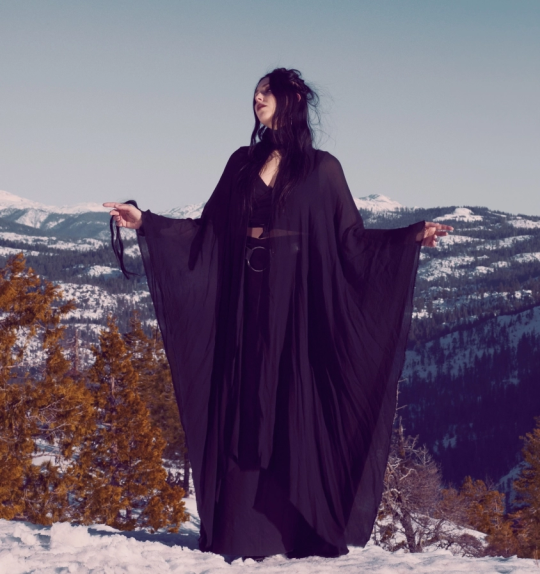
photographs by John Crawford
YOUR LAST ALBUM, HISS SPUN, HAD A LOT OF EXPLOSIVE GUITAR MOMENTS. IS THIS ACOUSTIC RECORD A REACTION AWAY FROM THAT?
CHELSEA WOLFE Honestly, I didn’t know exactly what I was going to do next. I was so completely enveloped and focused on doing that record. And it was cathartic for me. That record felt very internal, but very explosive, as well, letting a lot of things out I hadn’t thought about or talked about before. Maybe the natural reaction to that is to retreat into the wilderness and just write a really quiet album. It’s introspective, but it’s also about the history of women and what we’ve gone through over these years and how a lot has changed, a lot hasn’t changed.
IS THAT INSPIRED BY RECENT EVENTS IN THE WORLD?
I’m sure it is. Part of it has to do with just being a woman and getting older and understanding things more and just feeling that really visceral reaction to the way women are treated and seeing it on the daily in our society and on the news.
THIS ISN’T YOUR FIRST ACOUSTIC PROJECT. DO YOU GET A DIFFERENT FEELING ONSTAGE WHEN YOU’RE ALONE VERSUS BEING WITH A BAND AND HAVING AN ELECTRIC GUITAR IN YOUR HANDS?
I haven’t done shows by myself onstage in a really long time and it’s not so easy for me. It’s definitely more comfortable to have your band with you and to be able to lose yourself in all these sounds and things that you’re creating together. But I also feel really ready and excited to do that, even though it’s scary. I like to push myself into new territories musically and physically. Heavy music can be really intimate, and solo can be very intimate. So in a way it’s the same thing, being up there and baring your soul for people.
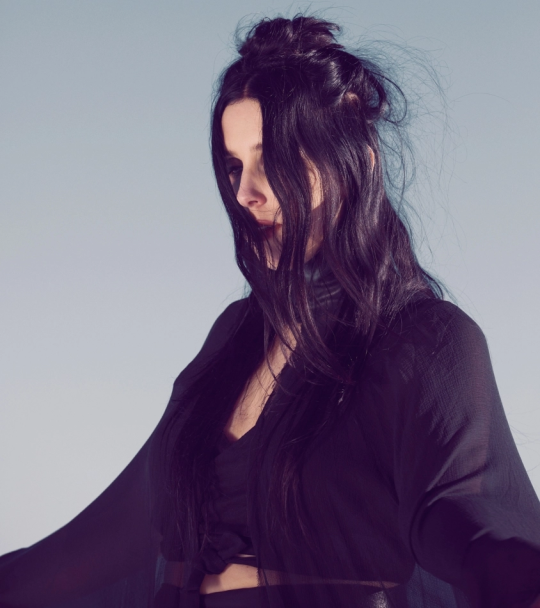
HOW IS THE NEW RECORD BEING MADE?
I’m recording it at home. Originally, I really wanted to do everything myself. Sometimes as a female artist, if one man is involved with one little thing on your record, they end up getting a lot more credit for it. I was being a little defensive at first. But as I started approaching it, I felt like that was actually a very lonely way of doing things and it didn’t sound like much fun. So I decided to involve Ben, and he’s helping engineer it so that I can just focus on recording the parts and not having to run back and forth to the board or computer.
I really wanted to play every song just with me and an acoustic guitar. That was important for me. So they all started in that way. We might add some electric guitar, or some kind of electronic beats to it.
I sat down with Ben and that really helped me finish everything — we would talk about a song and then I would run upstairs to my writing room and suddenly have all these lyrics that finished a song.
HOW ARE THE NEW SONGS RELATED TO SOME OF THE QUIETER MOMENTS ON HISS SPUN?
I think it’s different. I did Unknown Rooms, which was a compilation of a lot of acoustic songs I’d written over the years. They were just written with the idea of playing them as a solo artist in mind. I think every record definitely is going to have some heavy moments and some soft moments. Abyss had “Crazy Love” and Hiss Spun had “Two Spirit.” It’s just part of me to oscillate between the two.
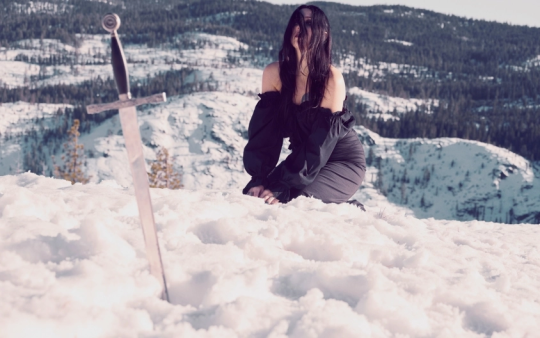
CAN YOU TELL ME ABOUT ONE OF THE SONGS?
One is called “Be All Things.” It’s very introspective and it’s very triumphant. Conceptually, it’s about a Victorian-era woman who is a maiden but very much wants to be a warrior — and just thinking about nature and environmentalism and how long that has been a problem and how we’re trying to make changes but still we’re just destroying the earth. Just when it seems like something’s changing, it just gets worse. I think my music in general represents the soft and the strong, embracing the feminine and masculine of myself. This album is very much along the theme of that dichotomy. And I think a lot of people can relate to that, as well, whether it’s a man or woman, a non-gender-specific person. I think a lot of people are starting to embrace that about themselves, the soft and strong, and then really finding that empowering.
DID THAT COME AS A REACTION TO SOMETHING?
It’s a bit of a reaction, but it’s also just something that’s really been a part of me for a long time. I’m not just one thing. You can’t really put me or my music into a box. Sometimes that’s frustrating for me because I think maybe it holds me back in a way, but then sometimes I think that is why I’ve been able to do what I do and why I have any kind of success as an artist and a musician. I’m saying in the song: “I want to be all things.” I don’t want to be held back anymore and I don’t want to feel like I need to quiet my voice. I just want to be who I am and be free.
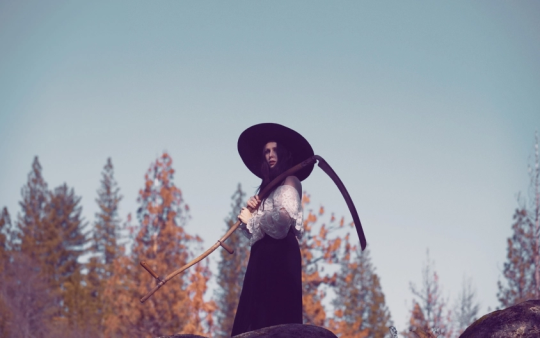
IT SEEMS LIKE A LOT OF PEOPLE FEEL THAT WAY. JUST LOOK AT HOW MANY WOMEN WERE RECENTLY ELECTED TO CONGRESS.
Exactly. It’s amazing. And I think it’s very indicative of this time and more and more women and non-gender-specific people are really starting to speak up for themselves and let go of the fear of that. So that’s definitely a strong theme with this new album.
HOW HAVE YOU EVOLVED AS A LYRICIST SINCE YOUR FIRST RECORDS?
I’m a much better writer and I’m taking the time to really make sure I’m saying the right thing. As a younger artist, I would just write a song and then that was it. I never really went back and fixed up the lyrics or changed a word if I didn’t like it. I love words and I love reading and I love thinking about language and how to make something sound the best way but also infuse a lot of meaning into even just a short phrase. On this new album, I’m using some archaic language to talk about new things.
HOW ARE YOU USING ARCHAIC LANGUAGE?
I was spending some time with my great-grandmother before she died and I would often write down a word here and there that you don’t hear anymore. Jess is very much like that, too. She was raised by her grandparents, so she has a lot of cute old phrases that she says that you don’t hear very often. There’s a moment [on the record] with the word “daylight plumed my skin.” That’s something I’ve probably read in some old poetry books. It’s something sensual, and I’m always trying to bring sensuality into language and keeping that alive because I feel like sometimes that is a dying art.
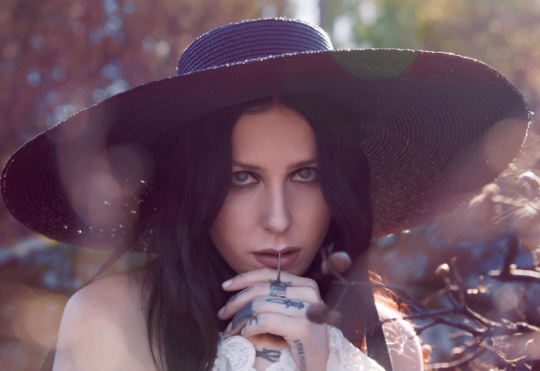
ASIDE FROM YOUR OWN TOURS OVER THE LAST YEAR, YOU DID TOURS WITH MINISTRY AND A PERFECT CIRCLE. HOW DID THAT GO?
I’m such a big fan of Ministry and they’re really great — but I don’t think their audience was as open as I thought they might be. So it was a little bit tough if I’m honest. I got really aggro on the Ministry tours because sometimes it felt like their audience was just looking at us with disgust. Not all of them. Of course, there were some really nice people that wanted to be open to it. It ended up being fun and it brings you and your band closer together, too. I just took it as another learning experience.
Al [Jourgensen] was so great and he would invite us onto his bus after the show and just talk about music and stuff for a long time. We would overhear him describing us to other people, talking about me and Jess: “They’re women and they’re angry and they’re making good music!” It was really cute.
A Perfect Circle was very different. Their audience was a lot more accepting of us for some reason. Definitely bigger venues than I’ve ever played. I have a long way to go in knowing how to work a room of 8,000 people because that’s totally different than what I’m used to be playing. Maynard actually invited us out to his winery. We got to experience his wine and homegrown vegetables and stuff. It was really cool.
YOUR FANS SEEM WILLING TO FOLLOW YOU THROUGH YOUR SHIFTS IN TONE. AND NOBODY REALLY KNOWS WHAT THEY LIKE UNTIL THEY SEE OR HEAR IT.
That’s true. And I think it makes you a better artist when you do things that people aren’t expecting. It’s like when I heard Black Sabbath doing the song “Changes” the first time — after hearing all their other heavy music. Them doing something so touching and intimate helped me understand the freedom to just sing whatever song is calling to you.
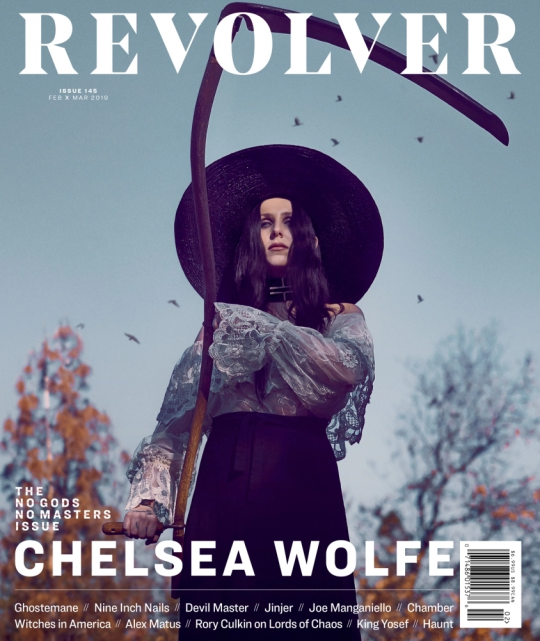

Chelsea Wolfe is the featured Cover story in the new Feb/March “NO GODS, NO MASTERS” Issue of Revolver Magazine. Click HERE pre-order a copy of her cover issue.
Full article via MusicRadar
“I’ve been able to do some really cool stuff, despite being undefinable and an outcast,” Chelsea Wolfe tells us.
It’s a strange, especially cruel double-edged sword that the more different you are as a musician to anyone else around at the time, the harder you can become to ‘market’ and gain some reward for that talent. And as compelling as Chelsea Wolfe’s music is when you take the time to listen, and it really is incredible work, there’s no escaping that the Sacramento artist’s five albums to date explore wildly diverse ground that’s difficult to label in traditional terms.
Despite an undeniable but gradual rise that’s seen her solo band play on all manner of varied bills, she remains more a cult figure than we think she should be.
“I think it makes it more difficult for any artist to break through when you can’t be put into a simple box,” she tells us backstage in Bristol on a European tour supporting industrial behemoths Ministry.
“It’s easier to ‘sell’ someone if you can be like, ‘Oh she’s an acoustic singer-songwriter from California’ or whatever. But that’s not really all I am, I have all these different sides and influences, from doom-metal and old country, to trip-hop and I bring all those things together in my own way.
“I think it’s more difficult to get certain opportunities because some people just don’t know what to do with me, but at the same time it’s been really cool because since we can fit into a lot of different worlds we’ve got a lot of different opportunities to play at festivals we wouldn’t normally fit on, because someone saw something in us.”
Wolfe’s last two albums, 2015’s Abyss and 2017’s Kurt Ballou-produced Hiss Spun find her in an undeniably heavy era for an artist who also has a whole acoustic folk compilation under her belt (2012’s Unknown Rooms). They mix dark, dense and abrasive sounds with mesmerising tones and ethereal hooks to stunning effect on a journey into Wolfe’s world, with guest guitarists including Russian Circles’ Mike Sullivan and Queens Of The Stone Age’s Troy Van Leeuwen threading through the maelstrom.
There’s a lot to talk about and celebrate here, but the beginning feels the best place to start with Chelsea…
Going right back, were your musical tastes eclectic from a young age?
“Yes, definitely. Mainly because I grew up with a country musician as a father so there was old country and blues, from Johnny Cash to Led Zeppelin – they were one of my early influences through my father. And then my mum had really good taste too; she’d listen to Joni Mitchell and Bonnie Raitt, so there’s a female folk and blues artist influence from her. I was lucky to have a lot of really cool influences.”
You’ve followed your instincts as a musician, but have there been times when that has been difficult?
“Not really because the label I’m on, Sargent House, are very supportive of what the artist wants to do and their vision. So there’s never been this push of, ‘You should try to do this’ or some radio-edit version. I’m not saying that’s out of the question because a lot of bands have done that and been successful doing that.
“I think I have such a lovely audience who are supportive of what I want to do, I don’t think they want me to become more commercial; they want me to just be me and that has become the biggest blessing as an artist because, as I’m writing, I feel the support coming at me from all sides and it makes me want to do my own thing and want to give the authentic version of myself as an artist.”
You were in a band before you went solo, did you have to strike out alone to find your identity?
“I think so. I started as a singer-songwriter with an acoustic guitar and my voice. Then I was putting together my first record that had folk songs and rock ’n’ roll songs and I met Jess Gowrie, who is my current drummer, and we formed the band called Red Host for a few years in Sacramento where we’re both from. And that was heavy rock, hard-hitting songs and it was a lot of fun, but I just knew I had so much more in me and I wanted to be able to do different genres and bring them into my own style. So I had to just fly free for a while to find my own voice and my own style.
“Jess and I unfortunately didn’t talk for a number of years but once we reunited a few years ago it was very clear our musical chemistry wasn’t finished and luckily we started writing songs together again and that became Hiss Spun.”
It seems like it’s been a more traditional, word-of-mouth thing with people discovering your music. Does it feel like it’s been quite a gradual build for you?
“Totally, yes. I mean we’re on year seven of pretty continual touring and that’s obviously a very old-school way to gather a following and we’ve seen the growth from small clubs to some cool theatres. So it’s definitely a gradual growth and a lot of people tell me, ‘Oh I heard about you from a friend or someone recommended it.’ I don’t get a lot of press that other musicians might get. I don’t really know why, maybe because I’m like this weirdo and they don’t really know what to do with me! But it’s been cool doing things in a more organic way.”
And those kinds of fans tend to stick with you, they’re often loyal…
“It seems like it. I see a lot of the same faces at shows and I recognize them from really early shows.”
Who have been influences on the heavier side of your music?
“Queens Of The Stone Age were a big influence for myself and my drummer, Jess. Bands that we’ve played with have ended up influencing us a lot; Swans, Sunn O))), Russian Circles even. I think playing with all these heavy bands is a reason I started going in a heavier direction for Abyss because after [third album] Pain Is Beauty I kind of imagined that I would go back to acoustic but then we were doing all these tours with heavier bands and I thought, ‘That looks like so much fun.’ I wanted to write some heavy songs that are fun to play and that I could really lose myself in.”
Is the acoustic guitar still part of your world?
“Oh yeah, I’ve actually written a ton of acoustic songs in the past year and I’ll probably focus on that next. I just follow my musical intuitions and instincts. For the last couple of records I’ve really wanted to make heavy music but now I think something in me is pulling me back to this more minimal acoustic folk, which are really kind of my origins as a musician.”
Abyss and Hiss Spun featured guest guitarists – with Russian Circles’ Mike Sullivan and then Queens Of The Stone Age’s Troy Van Leeuwen. They obviously felt like the right players to contribute to those records, but how much direction did you give them or is there a trust there from the start?
“I think it’s a bit of both. Somehow it comes together in the right way where I know this is the person I want to play on the record with these songs, and then some of the songs I’ll be like, ‘Do your thing and let’s see what happens.’ But there will be a song like 16 Psyche where I really left space for Troy and I knew that I wanted him to write a big lead part over the breakdown/bridge, whatever you want to call it, towards the end of the song. It was kind of a back and forth situation where he would play something and I would say, ‘Focus on that part.’ It was really cool to have a great player put so much trust in me as I was putting so much trust in him.”
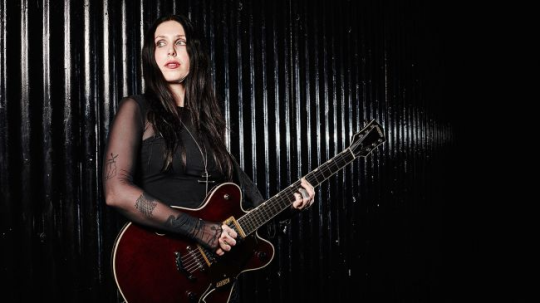
On Hiss Spun there’s also more of a band-in-a-room dynamic than ever before, is that reflective of the creative process?
“Yes, I wanted this one to be more collaborative and more as a band. So we did a lot of jamming together, Jess and Ben [Chisholm, bass player and guitar] and I. Also we’d bring in different lead guitar players to add some flourishes. But a lot of it was just the three of us jamming out. The traditional rock ’n’ roll process of songwriting, and also Ben wrote a lot of the guitar parts. There’s more of his vibe and his influence there, which is cool.”
Do you find in that context there are more happy accidents with things that happen in the moment?
“Yes, totally. I can completely understand why there are people who just jam in their garage with friends and don’t ever play shows or anything. That’s really the most fun part – having some drinks and jamming with your friends. Coming up with these cool ideas. That’s even more fun to me than playing live so, yes, I think a lot of happy accidents come out of that.”
Are some of what sound like electronics on Abyss and Hiss Spun actually guitar? Do things start to blur between those worlds?
“Probably yes, because Carrion Flowers, a song that I would consider to be an electronic song, is actually a bass part that’s run through some pedals into speakers, recorded from there and then run through even more pedals. So we kind of make our own electronic sounds and we like to sample things a lot.
“Even just upstairs there’s a crazy old fan that’s making some really cool patterns so I recorded that and I’m sure I’ll use that in a song later. Ben and I are always collecting weird sounds that we’ll put into MIDI or Ableton, twist it around or top little parts of it and make a totally new beat.”
What’s the strangest sample you’ve ever captured?
“I think the strangest one so far is probably the track Scrape, which is the final song on Hiss Spun and the final song in the set too. Our friend was working at a recycling centre and I think we asked him to take some samples of weird sounds. So he sent us the sound of the tractor scraping bottles up off the floor and it just had that natural rhythm and that ended up becoming the basis for Scrape. I know people might not imagine using the floor of the recycling centre but it really worked out well.”
There’s this relationship between beautiful and quite unsettling sounds in your music, is that difficult to balance, or is it just subconscious for you now?
“I think it’s become subconscious for me. It’s something I’ve always done, whether it’s putting a prettier melody like a softer vocal part over something super-heavy, I think it makes the front of house sound guys’ jobs intensely frustrating because you have this wall of sound with this whispery vocal over it but I don’t know, it’s just what I do.”

2017’s Hiss Spun captured goth-rock high priestess Chelsea Wolfe at her darkest and heaviest, channeling twisted family history and calling in a demonic assist from one Aaron Turner to chilling effect. With a guest appearance on Deafheaven’s Ordinary Corrupt Human Love and a recent spot opening for A Perfect Circle introducing her to a wider audience in 2018, the musician is set to break even more hearts and raise even more hairs with her forthcoming new acoustic album, the unofficial follow-up to 2012’s excellent Unknown Rooms. We can’t wait.
full article via Revolver: here
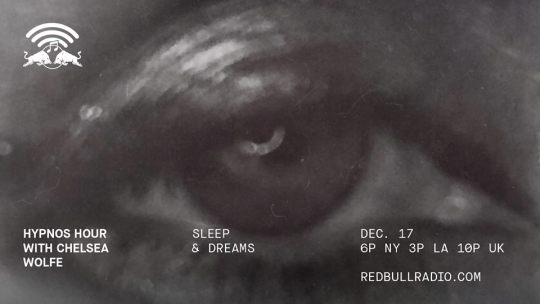
Tune in today for Chelsea Wolfe’s final episode of “Hypnos Hour” on Red Bull Radio. Airs today, Dec 17 at 3pm PST HERE.
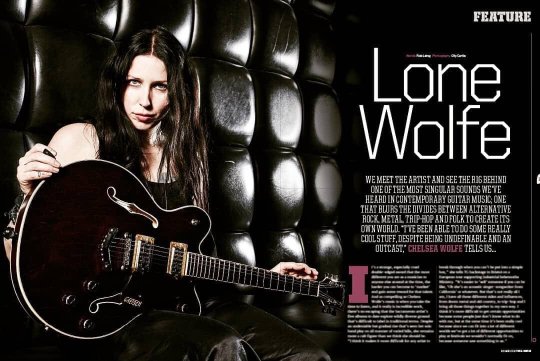
The new print issue of Total Guitar includes a six-page feature with Chelsea Wolfe and her touring rig. Photo by Olly Curtis